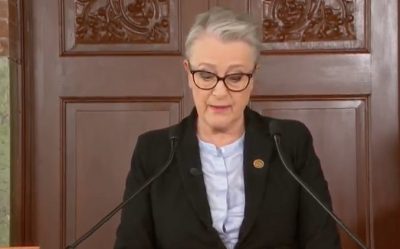The Norwegian Nobel Committee awarded this year’s Nobel Peace Prize to the UN World Food Programme (WFP), for its efforts to combat hunger not least in the middle of the Corona pandemic. The committee’s choice was also motivated by what it called an urgent need for more international solidarity and multilateral cooperation.

Both “seem to have a lack of respect these days,” said Berit Reiss-Andersen, who leads the committee which, under the terms of prize benefactor Alfred Nobel’s will, reflects political representation within the Norwegian Parliament. Norway has long been a firm supporter of and contributor to the United Nations, although its government has no control or influence over the decisions of the Nobel Committee.
“The Corona pandemic also shows how multi-later cooperation is absolutely necessary,” Reiss-Andersen, an attorney who also leads Norway’s bar association, said at the press conference following her announcement. She added that “global problems need global solutions,” and said she hopes a Nobel Peace Prize to the UN’s World Food Programme will “raise awareness” of hunger and spur desperately needed funding of the WFP’s efforts to provide food where needed.
The committee called the WFP “the world’s largest humanitarian organization addressing hunger and promoting food security.” Last year it provided aid to nearly 100 million people in 88 countries. Since hunger and control of food supplies have been used for centuries as a weapon in war and conflict, the WFP was also seen as a worthy winner of the Peace Prize for its efforts to prevent both.
The WFP has often been nominated for the Peace Prize and it usually figures in lists of top candidates. This year there’d been lots of speculation, however, that the Nobel Committee would recognize journalists and their work to defend freedom of the press and information, not least in current armed conflicts, during the rise of populist and authoritarian regimes, and amidst all the confusion and need for factual information during the Corona pandemic. Climate advocates, freedom fighters in Hong Kong and peace processes in various ongoing conflicts had also been top candidates.
The committee opted to shine the light on the UN’s organization, which needs more resources in order to help people in such countries as Yemen, Nigeria, the Democratic Republic of Congo, South Sudan and Burkina Faso, where many are “on the brink of starvation.” The committee noted how the WFP itself has stated that “until the day we have a medical vaccine (for the Corona virus), food is the best vaccine against chaos.” The WFP and other food assistance organizations nonetheless “do not receive the financial support they have requested,” according to the Nobel Committee.
Reaction to the Peace Prize was overwhelmingly positive, with the leader of the WFP overjoyed and others calling it “well-deserved recognition” of vital international organization. “I’m so glad,” said Marit Arnstad, a Member of Parliament who was among those known to have nominated the WFP for the prize. “The World Food Programme is a large humanitarian player that both prevents conflicts and hinders conflicts from escalating.”
It was an unusual Nobel Peace Prize press conference in many ways. There were few reporters allowed into the actual press conference at the Nobel Institute in Oslo Friday morning, because of Corona containment measures, and all had to social distance and use face masks. Reiss-Andersen herself had to announce the prize after hobbling into the room at the Nobel Institute with a broken foot.
There were more than 300 candidates for this year’s prize, nominated by leaders of national assemblies, academic institutions and qualified organizations around the world. A total of 211 of those nominated were people, while 107 were organizations.
The deadline for nominations last winter came before the Corona crisis gripped the world, with all the disruption and tragedy it has caused since. Infection control measures have also disrupted how the Norwegian Nobel Committee operates and how it will actually award the prize at a ceremony that’s always held on the December 10th anniversary of benefactor Alfred Nobel’s death.
The committee has already announced how the ceremony will be dramatically scaled down this year and moved from the large and mural-covered lobby of the Oslo City Hall back to the smaller and historic auditorium at the University of Oslo’s downtown campus. Called the Aula, it’s where former Nobel Laureates like Martin Luther King and the Dalai Lama received their prizes, and it’s also richly decorated with murals painted by famed Norwegian artist Edvard Munch.
NewsInEnglish.no/Nina Berglund

